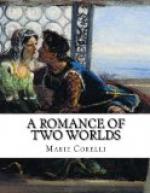and that of every other nineteenth-century painter,
thanks to the magnificent institution of free trade,
which has resulted in a vulgar competition of all
countries and all classes to see which can most quickly
jostle the other out of existence. But I am wearying
you, mademoiselle—pardon me! To resume
my own story. As I told you, I could think of
nothing but the one subject of Colour; it haunted
me incessantly. I saw in my dreams visions, of
exquisite forms and faces that I longed to transfer
to my canvas, but I could never succeed in the attempt.
My hand seemed to have lost all skill. About
this time my father died, and I, having no other relation
in the world, and no ties of home to cling to, lived
in utter solitude, and tortured my brain more and
more with the one question that baffled and perplexed
me. I became moody and irritable; I avoided intercourse
with everyone, and at last sleep forsook my eyes.
Then came a terrible season of feverish trouble, nervous
dejection and despair. At times I would sit silently
brooding; at others I started up and walked rapidly
for hours, in the hope to calm the wild unrest that
took possession of my brain. I was then living
in Rome, in the studio that had been my father’s.
One evening—how well I remember it!—I
was attacked by one of those fierce impulses that forbade
me to rest or think or sleep, and, as usual, I hurried
out for one of those long aimless excursions I had
latterly grown accustomed to. At the open street-door
stood the proprietress of the house, a stout, good-natured
contadina, with her youngest child Pippa holding to
her skirt. As she saw me approaching, she started
back with an exclamation of alarm, and catching the
little girl up in her arms, she made the sign of the
cross rapidly. Astonished at this, I paused in
my hasty walk, and said with as much calmness as I
could muster:
“‘What do you mean by that? Have
I the evil-eye, think you?’
“Curly-haired Pippa stretched out her arms to
me—I had often caressed the little one,
and given her sweetmeats and toys—but her
mother held her back with a sort of smothered scream,
and muttered:
“‘Holy Virgin! Pippa must not touch
him; he is mad.’
“Mad? I looked at the woman and child in
scornful amazement. Then without further words
I turned, and went swiftly away down the street out
of their sight. Mad! Was I indeed losing
my reason? Was this the terrific meaning of my
sleepless nights, my troubled thoughts, my strange
inquietude? Fiercely I strode along, heedless
whither I was going, till I found myself suddenly on
the borders of the desolate Campagna. A young
moon gleamed aloft, looking like a slender sickle
thrust into the heavens to reap an over-abundant harvest
of stars. I paused irresolutely. There was
a deep silence everywhere. I felt faint and giddy:
curious flashes of light danced past my eyes, and
my limbs shook like those of a palsied old man.
I sank upon a stone to rest, to try and arrange my
scattered ideas into some sort of connection and order.
Mad! I clasped my aching head between my hands,
and brooded on the fearful prospect looming before
me, and in the words of poor King Lear, I prayed in
my heart:




